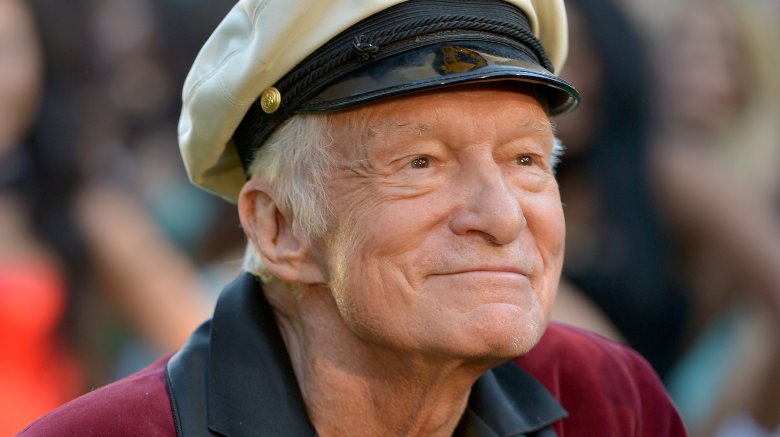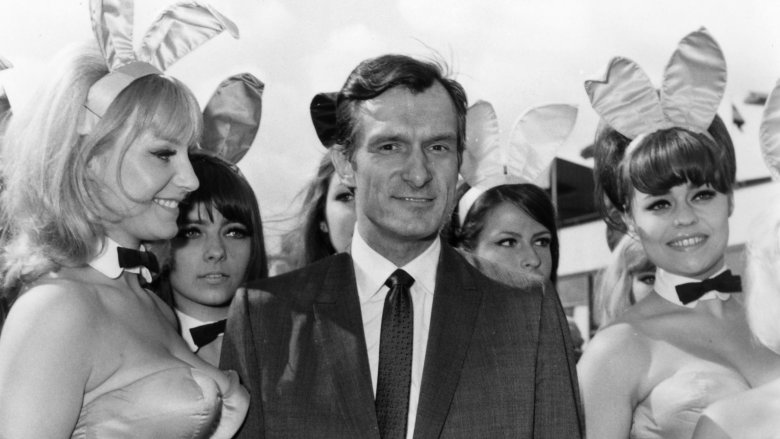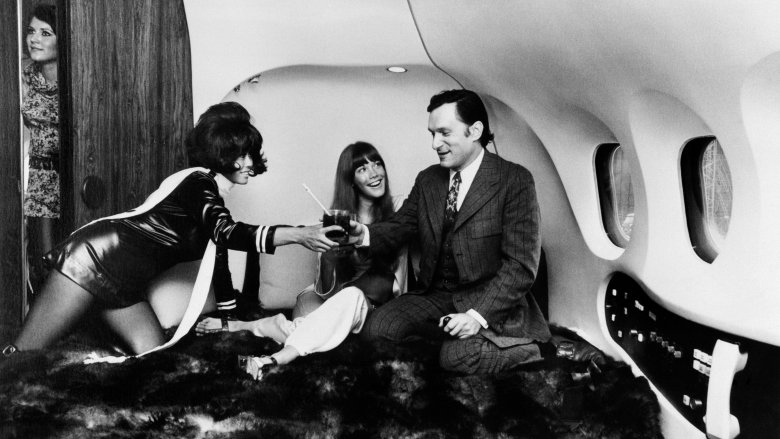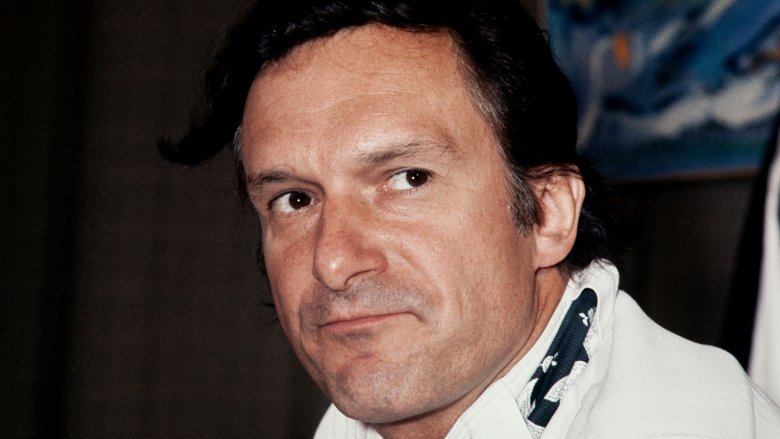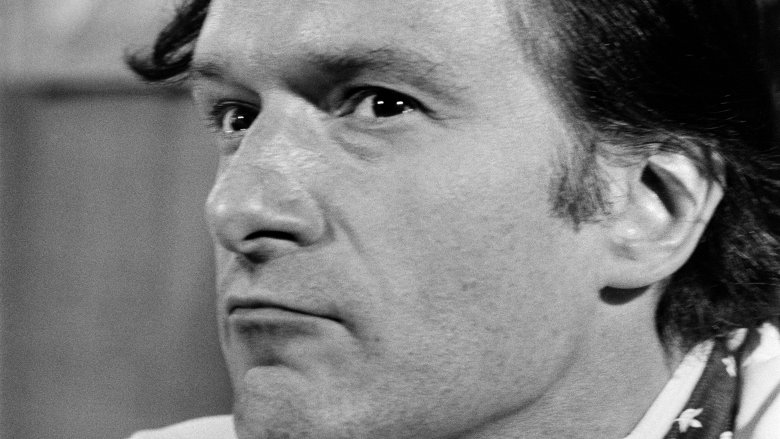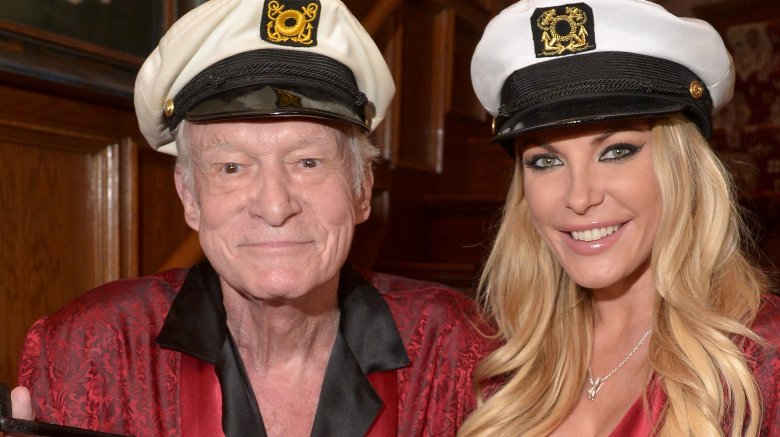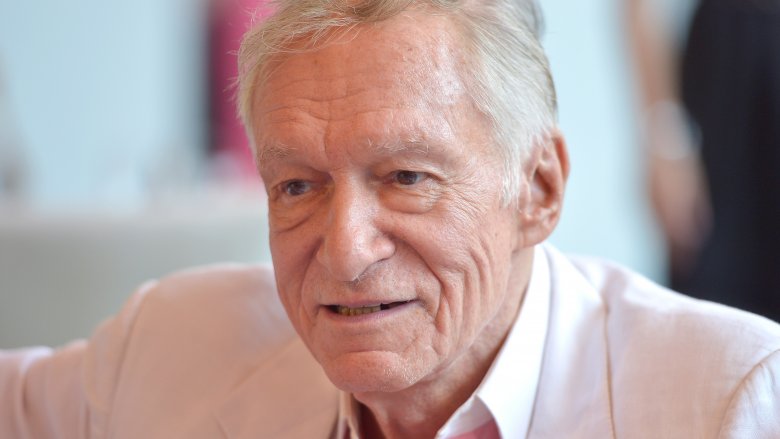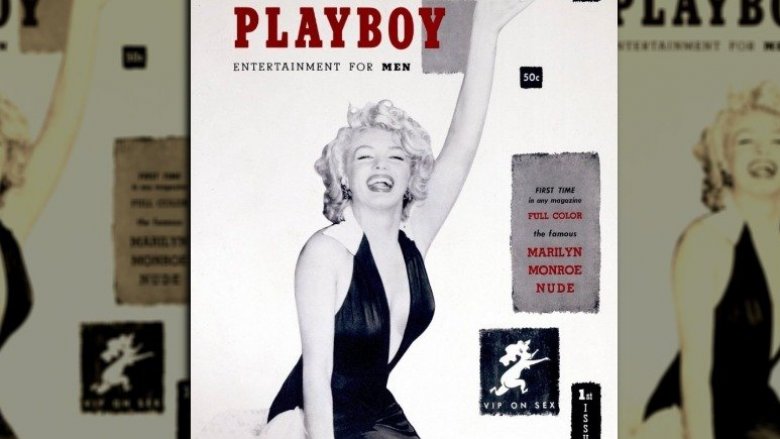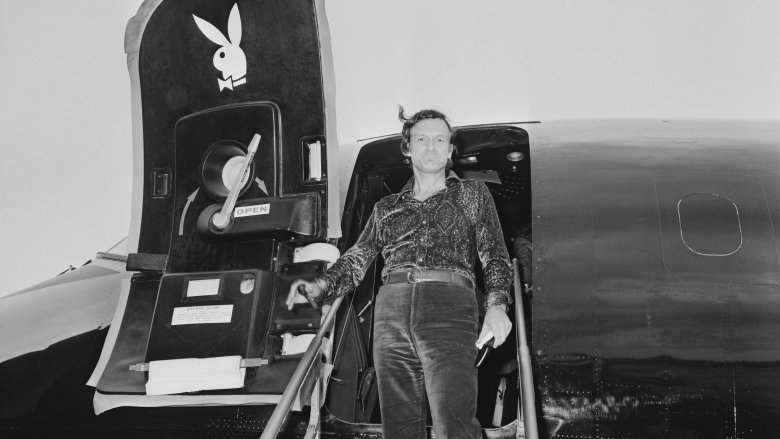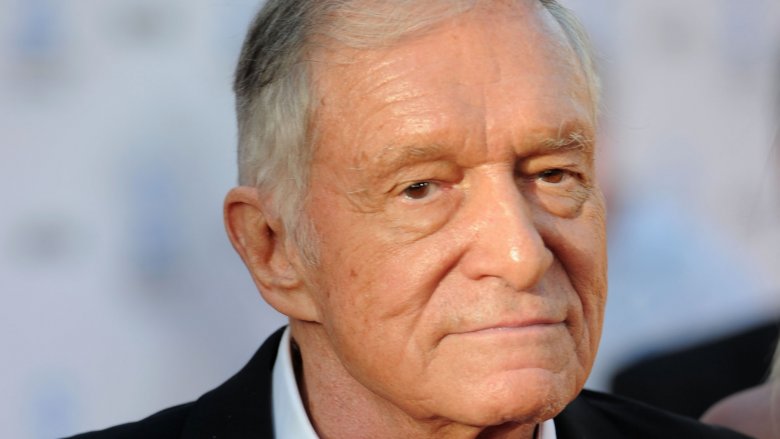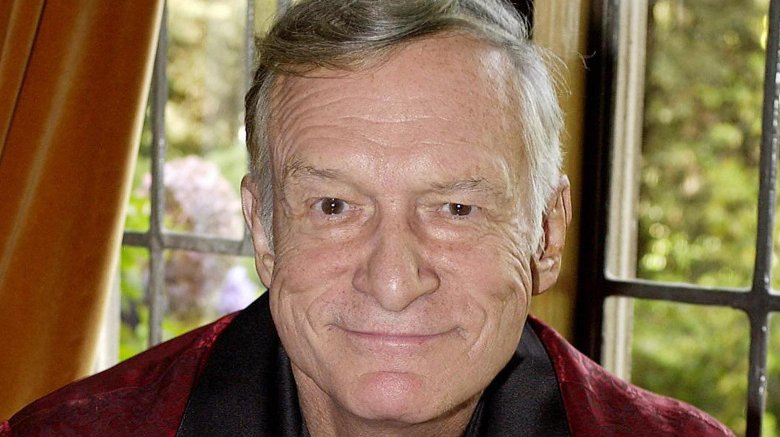The Untold Truth Of Hugh Hefner
Hugh Hefner, the founder of the iconic, if controversial, Playboy magazine, died Sept. 27, 2017 of natural causes at his famed Playboy Mansion. He was 91 years old. In light of the sad news, we're taking a look back at the life of a man who would go on to challenge the world's views and opinions about sex and stir up an intense amount of controversy, all while wearing fancy silk pajamas.
Here now is a look at the untold truth of Hugh Hefner.
He hated the repression of post-World War II America
Speaking to The Telegraph in 2009, Hefner revealed that the idea for Playboy magazine was influenced in part by America's gradual shift back to a conservative culture at the end of World War II.
"I looked back on the roaring Twenties, with its jazz, Great Gatsby and the pre-Code films as a party I had somehow managed to miss," he told the magazine. "After World War Two, I expected something similar; a return to the period after the first war, but when the skirt lengths went down instead of up I knew we were in big trouble. It turned out to be a very conservative, serious period — socially, sexually and politically."
"I just thought there was another way of living a life," he continued. "Under all the conservatism and the repression there was this yearning for something different. That's the reason the magazine was successful, why people embraced it from the very outset."
Hefner, who was born in 1926 to conservative parents to whom he referred as being "very repressed," also said his time working as a promotional copywriter for Esquire helped shape his soon-to-be iconic magazine. "Esquire was always for older guys, but ... it was very much devoted to male bonding and outdoor adventure," Hefner told CNN. "And I wanted to read a magazine that was a little more sophisticated and was focused really on the romantic connection between the sexes from a male point of view."
He claimed he came close to dating Gloria Steinem
Playboy would go onto become reviled among certain groups, particularly among feminists such as Gloria Steinem, who famously went undercover at Hefner's Playboy Club in New York City and later wrote about her experience for Show magazine.
But if Hefner is to be believed, their contentious relationship almost became something else. "Gloria and I go back a long ways," he told The Hollywood Reporter in 2011, "but it's more personal than you probably know. She worked as girl Friday for Harvey Kurtzman, who created Mad magazine, and he said, 'You gotta meet this girl, she's just like you: She can make a guy jump through hoops.' We actually exchanged phone calls and came very close to dating."
Incidentally, Hefner also mentioned that criticisms from feminists cut deeper than most. "Being attacked by right-wing Christians did not bother me," he said. "Being attacked by liberal feminists did."
He lost his virginity when he was 22
Although his name became synonymous with women and sex, Hugh Hefner was actually a bit of a late bloomer. According to The New York Times, he did not masturbate until he was 18 years old, and did not actually lose his virginity until he was 22. According to the Times, Hefner "wielded fierce resentment against his era's sexual strictures, which he said had choked off his own youth."
He said his first time was with the woman who would become his first wife, Millie Williams, with whom he engaged in "two years of foreplay" before sealing the deal, according to The Sun. In that same interview with The Sun, Hefner revealed he was saving himself because, at the time, he was serving in the army while his wife was studying in college.
Maybe he feels like he missed out on something in his youth, but the guy apparently made up for lost time because he supposedly went on to bed more than 1,000 women, but who's counting? "How could I possibly know? Over a thousand, I'm sure," Hefner told Esquire (via The Huffington Post) when asked about his number. "There were chunks of my life when I was married, and when I was married I never cheated. But I made up for it when I wasn't married. You have to keep your hand in."
He was devastated by his first wife's affair
Sadly for Hefner, losing his V-card came with "devastating" consequences that would last a lifetime.
"I had literally saved myself for my wife, but after we had sex she told me that she'd had an affair," Hefner revealed (via The Sun). "That was the most devastating moment in my life." The infidelity reportedly occurred while the couple was still engaged. "My wife was more sexually experienced than I was. After that, I always felt in a sense that the other guy was in bed with us, too."
Speaking to The New York Times in 2001, Hefner, who divorced Williams in 1959, alleged that his second wife, Kimberley Conrad, also cheated on him prior to their split in 1998. The behavior that followed was "overcompensation," Hefner admitted to the Times, laughing at the number of women he simultaneously dated and his attempts to keep them from dating anyone else.
His third marriage almost didn't happen
Hefner's third trip down the aisle proved to be more tumultuous than the others.
In June 2011, just five days before he was set to marry 24-year-old Playmate Crystal Harris, Hefner confirmed on Twitter that the wedding had been called off, claiming, "Crystal has had a change of heart." Harris would later confirm as much in an interview with Ryan Seacrest, although she also claimed the decision had been "mutual."
Unfortunately, that was just the beginning of the drama. In July that year, Harris went on Howard Stern's radio show, during which she alleged that she only had sex with Hefner once during their relationship and that it lasted "like two seconds." "Then I was just over it," she said, according to People. "I was like, 'Ahhh.' I was over it. I just like, walked away. I'm not turned on by Hef, sorry."
Hefner denied Harris' claims, later telling The Hollywood Reporter that they had sex "once a week." "We had sex with her and a girlfriend," he revealed. "We had sex the first night that we met, with another girl, and it was such a nice relationship that I kept them both over for a weekend."
And yet, miraculously, Harris confirmed in June 2012 that they had reconciled and were back together. They married on New Year's Eve that year, reportedly after signing an "ironclad prenup." Ah, romance!
He viewed himself as a pioneer
In a 1992 interview with The New York Times, Hefner revealed that, out of all his accomplishments at the time, he was most proud of the way he "changed attitudes toward sex," he said. "That nice people can live together now. That I decontaminated the notion of premarital sex. That gives me great satisfaction."
After his death, CNN called him "a cultural icon" who "championed a more libertine view of sexuality that went against the puritanical elements of the times" and turned his brand "into a forum for sexual freedom and progressive politics, advocating for civil rights and free speech."
"He waited till the world caught up with him," said comedian Bill Baher (via CNN) when Hefner received the Friars Club lifetime achievement award in 1998.
He's buried next to Marilyn Monroe
According to TMZ, Hefner is buried in the crypt next to Marilyn Monroe's at the Westwood Village Memorial Park in Los Angeles, Calif., which he purchased for $75,000 in 1992.
Monroe, of course, was featured on the cover of the very first issue of Playboy after Hefner found an old nude photo of Monroe and purchased it for $500.
"Jay Leno suggested that if I was going to spend that kind of money, I should actually be on top of her," Hefner later said, according to the New York Daily News. "But to me there's something rather poetic in the fact that we'll be buried in the same place. And that cemetery also has other meanings and connections for me. Friends like Buddy Rich and Mel Torme are buried there. So is Dorothy Stratten."
We're not so sure his eternal resting spot is quite so poetic to Monroe, considering he reportedly didn't get her permission to her photo in his magazine.
He was investigated by the FBI
According to The Hollywood Reporter, the Federal Bureau of Investigations began investigating Hefner in 1972 after suspecting him of "covering up the use of illegal narcotics" in his Playboy Mansion. The FBI reportedly tried to get to Hefner through his secretary, Bobbie Arnstein, who committed suicide in 1975, after getting arrested on drug charges the year prior.
At the time of her suicide, Hefner accused the FBI of conducting a "a politically motivated anti‐Playboy witch hunt," according to The New York Times. Arnstein had been sentenced to 15 years, but was free pending an appeal when she died. In a letter found after her death, Arnstein called her former boss "a staunchly upright, rigorously moral man — and I know him well and he, has never been involved in the criminal activity which is being attributed to him now," the Times reported.
The FBI never did get any solid dirt on Hef.
He blamed Peter Bogdanovich for his stroke
In 1985, Hugh Hefner was hit with another bout of bad luck when he suffered a mild stroke. He blamed the stroke on the 1984 book The Killing of the Unicorn by Peter Bogdanovich, which covered the murder of former Playmate Dorothy Stratten by her estranged husband.
"[My stroke] resulted from stress developed over the last year in reaction to the pathological book written by Peter Bogdanovich," Hefner said in a statement, adding that his recovery was "total and something of a miracle."
Perhaps unsurprisingly, Bogdanovich scoffed at Hefner's words. "Confronting Hugh Hefner with the reality of his life and in particular what he and his magazine do to women apparently is something he can't face," Bogdanovich said in his own statement to the Chicago Tribune. "I'm sorry if making him face it had something to do with making him sick."
"I feel a lot worse for the human cost paid by all the women who don't issue press releases. It would be a real miracle if his life would change to benefit women," he added.
Ouch.
He never wanted to grow up
Given the lavish lifestyle that he led, it should surprise no one that Hugh Hefner liked to live his life with a boyish heart.
"I'm never going to grow up," he told CNN in 2009. "Staying young is what it is all about for me. Holding on to the boy and, um, long ago I decided that age really didn't matter and as long as the ladies ... feel the same way, that's fine with me."
He echoed similar sentiments in his 1992 interview with The New York Times. "I'm one of the luckiest guys in the world," he said. "The boy in me who wanted to live a wonderful life and be famous like a movie star got his 15 minutes, which turned out to be 40 years. Like the Great Gatsby, my view of my life was very much as an adolescent boy. The child in me was always the best of who I am. I've never let go of that."

